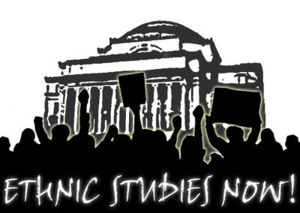Ethnic Studies Report
The 2007 Ethnic Studies Report was compiled by 15 Columbia and Barnard students in an independent study during the spring of 2007 to define a student vision Ethnic Studies and highlight recommendations for the future of the fields at Columbia.
Contents
Report
We are a group of students who share an academic concern and an intellectual investment in Ethnic Studies. Continuing the legacy of the student organizers who first advocated for Ethnic Studies at Columbia, we have taken upon ourselves the work of researching and producing this document in order to catalyze Columbia University and Barnard College to real institutional support for a field in which it is currently lagging. Given the critical juncture at which the Center for the Study of Ethnicity and Race (CSER), the Institute for Research in African-American Studies (IRAAS), and the Barnard Africana Studies Program currently stand, we want to make clear that our demand and concern is for a robust Ethnic Studies program at both Columbia and Barnard Colleges. The centers are instruments for Ethnic Studies, therefore we ask not merely for more resources, but for a recommitment to Ethnic Studies as a specific intellectual inquiry with a particular history and an unique epistemological framework.
What is Ethnic Studies?: History, Methodology, and Context
Ethnic Studies is a critical analysis of the social construction of race in the United States, drawing from historical and contemporary perspectives to frame the ongoing process by which people of color are grouped and defined at the complex intersections of race, gender, class, sexuality, and nationality. It is both interdisciplinary and multidisciplinary, not confined to one academic discourse, but rather involves a methodology that draws from the strengths of each of these fields and transcends their individual weaknesses. Born from demand in the 1960’s, Ethnic Studies as a field is marked by persistent popular struggle, such as the Columbia student protests of 1996. It is also rooted in the voices of historically and structurally oppressed peoples of color, intricately tied to community struggles, and oriented towards an overarching goal of societal transformation. By necessity Ethnic Studies has a fundamentally different premise from other fields that may or may not incorporate race, such as Area Studies like Asian Studies and Latin American Studies or analyses of race in the U.S. through fields like sociology or anthropology.
Ethnic Studies As Central to Columbia University
As a community that prides itself on diversity, we are annually scarred by incidents that demonstrate our lack of a critical language necessary to analyze and comprehend the hierarchy of difference that defines our society. Ethnic Studies examines the origins of these differences, and provides necessary tools for us to grasp the dynamics of race on our campus and in our interaction with our neighboring and global communities. It can propel Columbia to the forefront of new academic thought on par with, and hopefully beyond, our innovative peer institutions. In sum, the stated goals of Columbia University as well as the Columbia College Core Curriculum can never be fully realized without the critical lens that Ethnic Studies provides.
How We Measure Up: Columbia University in Context
CSER, IRAAS, and the Africana Studies Program are immensely under-funded and under-supported by Columbia University, and have been consistently behind the university's peer institutions and other leading institutions in various fields of Ethnic Studies. CSER’s course offerings reflect limited resources; Spring 2007 saw only four courses, including our student-initiated independent study. No program has autonomous hiring power, leaving their limited faculty development at the mercy of established departments. In comparison with other institutions, which boast department status, graduate programs, at least 16 courses each semester, hiring power, and various forms of innovative and community-related programming, Columbia's programs are in a deplorable condition.
Ethnic Studies at Barnard College
While Barnard College supports the critical analysis of gender through a strong Women's Studies Department, the critical analysis of race and ethnicity is almost completely ignored. The Africana Studies Program is denied departmental status and crucial resources while the creation of an Ethnic Studies Department is vocally opposed by top Barnard administrators. This administrative resistance is out of character for a small, liberal arts college that prides itself on responding to its student's educational needs. The majority of current Barnard students are not prepared to theorize issues of race and ethnicity when these issues are only marginally addressed in scattered courses and students must rely on Columbia College’s small course offerings in the field to fulfill their academic interests.
Recommendation Highlights
- Departmental status for current centers, institutes, and programs by 2010.
- Autonomous hiring power for all programs; increased funding to support faculty lines.
- Launching an immediate fundraising initiative towards an endowed faculty fund for CSER.
- Faculty Support & Development, including
- A minimum of 10 Core professors for each program
- A commitment to increase tenure track opportunities for professors in the fields of Ethnic Studies
- An immediate Cluster Hire of no fewer than 5 Ethnic Studies professors through the Office of the Vice Provost for Diversity
- Curricular Reform; increased course offerings including the addition of:
- Native American Studies
- Inclusion of the study of racially oppressed Middle Eastern Americans
